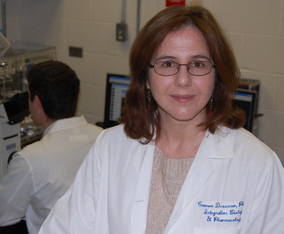Dessauer Lab
Welcome to Carmen Dessauer’s Laboratory of Cyclic AMP Signaling
Dept. of Integrative Biology and Pharmacology
Cyclic AMP signaling
The enzyme adenylyl cyclase synthesizes the intracellular second messenger cyclic AMP, which plays a key role in functions ranging from control of heart rate and force of contraction to learning and memory. Many hormones and drugs mediate their actions by binding to G protein-coupled receptors that regulate cyclic AMP production. Our laboratory is using biochemical, molecular, and cellular techniques, including live-cell imaging, FRET, and FLIM to understand the complex regulation of adenylyl cyclase by heterotrimeric GTP-binding proteins and the compartmentalization of cyclic AMP signaling as they relate to heart disease and chronic pain.
of heart rate and force of contraction to learning and memory. Many hormones and drugs mediate their actions by binding to G protein-coupled receptors that regulate cyclic AMP production. Our laboratory is using biochemical, molecular, and cellular techniques, including live-cell imaging, FRET, and FLIM to understand the complex regulation of adenylyl cyclase by heterotrimeric GTP-binding proteins and the compartmentalization of cyclic AMP signaling as they relate to heart disease and chronic pain.
A major question in the laboratory is how the fidelity of signaling is maintained within a cell. Cyclic AMP is a small diffusible molecule, yet many hormones stimulate cyclic AMP production but elicit different biological responses. We are examining how localization of adenylyl cyclase to specific complexes within the membrane plays a role in cellular signaling. We have discovered that specific anchoring proteins of cAMP-dependent kinase (AKAPs) recruit adenylyl cyclase as well as other regulatory molecules. These signaling complexes have important roles in the heart to control contractile events and hypertrophy. In neurons, AKAP-dependent complexes regulate cAMP-dependent signaling involved in pathways that generate chronic pain. We are currently using biochemical and functional studies in neurons and heart to further define the nature of adenylyl cyclase complexes and to understand how specificity of signaling is generated and maintained.
Click to: Check Out All the Nobel Prizes Connected with Cyclic AMP!
For website concerns, please contact Dr. Carmen Dessauer.